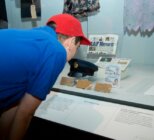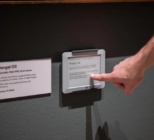New software developed by University of Leicester researchers is being trialled, which allows organisations to collect user data in what it says is “an inclusive and accessible way”.
The software, designed for the heritage and charity sectors, has been designed to allow organisations to quantify the impact of their services on health and wellbeing.
The LeicSurvey been designed to improve the gathering of user feedback via software, which it said is often costly, and made more difficult by accessibility issues or language barriers. It is hoped that the completed software will eventually be put on the market.
Researchers at the university, which is also home to the Research Centre for Museums and Galleries (RCMG), have received £62,500 from the Economic and Social Research Council (ESRC) via the ARC Accelerator to validate the software in practice.
The team is currently working with the University of Leicester Heritage Hub to pilot LeicSurvey with regional heritage partners, including Leicester City Council (Museums and Galleries) and North Northants Council (The Chester House Estate).
Dr Himanshu Kaul from the University of Leicester School of Engineering said LeicSurvey “has the potential to be transformative in facilitating strategic evaluation of heritage assets and programmes.”
Dr Nataly Papadopoulou, Lecturer and Assistant Professor at the Leicester Law School, said it was “not your average feedback gathering software”.
“We have pursued a ‘dignity by design’ approach to create LeicSurvey that embraces ethical data gathering, which we anticipate will serve as an exemplar for our competitors.
“[The software] places the user at the heart of feedback gathering, prioritising ‘voices’ and ensuring ‘dignity’ shines through the design and content. We want to use LeicSurvey to tell the










